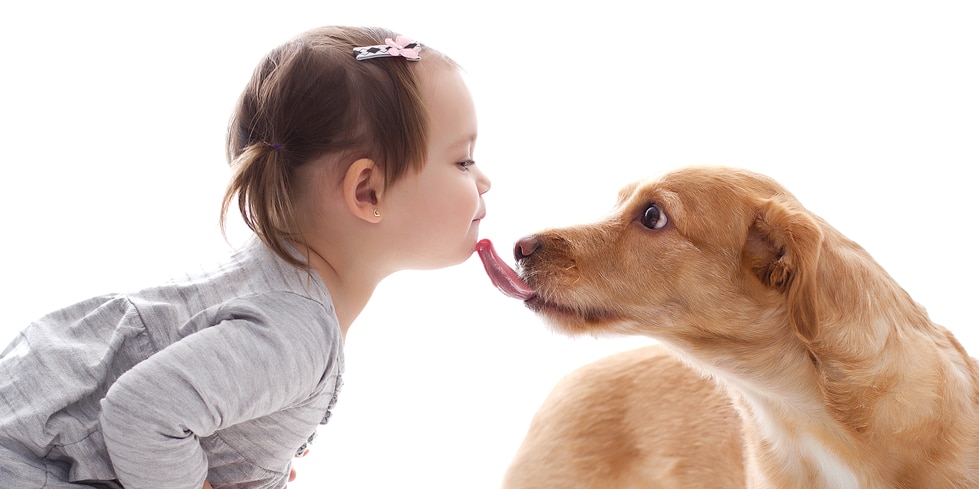You let your dog lick your face as you give it a big hug. It seems harmless and affectionate. But is it healthy?
A 2011 Japanese study set out to test the common wisdom that a dog’s mouth is cleaner than a human’s.
Researchers took bacterial samples from the teeth of 66 dogs and analyzed them. They discovered that dogs’ mouths were rife with bacteria that can cause disease in humans.
They also analyzed the mouths of the people who came into close contact with the tested dogs. The dog owners were positive for many of the germs found in their pets’ mouths.1
Is a Dog’s Mouth Cleaner Than a Human’s?
The study revealed that dogs had high levels of three kinds of bacteria: Porphyromona gulae, Tannerella forsythia, and Campylobacter rectus.
What do these germs do to people? They primarily cause gum disease.
Gum disease is more serious than it sounds. It does more than cause dental problems. It’s linked to diabetes, heart disease, stroke, arthritis, and kidney disorders.2
Those aren’t the only risks of kissing your dog. Other studies have found different pathogens in dog mouths. Dr. Mehmet Oz recently weighed in on the health risks of dog licks.
“A canine lick on the lips could jeopardize your health,” he said. “The half-eaten hot dog your dog found on the street—or the feces he was nibbling on—could be loaded with germs and bacteria such as salmonella, giardia (intestinal bacteria), hookworm, tapeworm, and many others, putting your family’s health at risk.”3
Recommended for You: The Fountain of Youth Now Fits in a 6 oz. Glass
It’s not a rare plant from the Himalayas, or a hard-to-find nutrient with a name you can’t pronounce. This common berry outranked 40 other fruits and vegetables for overall antioxidant activity in a USDA study at the Human Nutrition Center on Aging at Tufts University. And now you can get the antioxidant power of 1,000 cups of this power-berry in one 6 oz. serving.
In fact, this health elixir is the easiest way to help fight free radicals that accelerate aging, cause wrinkles, gray hair, and threaten your health. Go HERE for details.
One study determined that a dog’s intestinal tract can contain up to 30 million roundworm eggs. Roundworm in humans causes inflammation and blockage of the intestines, enlargement of the liver or spleen, and lung inflammation.4
Doctors warn that even kissing a dog on the head or fur can transmit disease. Through slobbering, licking, and scratching, the germs in a dog’s mouth can end up on its coat.5
What About Cats?
Researchers say that cats’ mouths are cleaner than dogs’. Cats do not eat feces. Generally, their mouths and digestive tract contain bacteria that are less harmful.6 Of course, there aren’t many cats that give friendly licks.
There are simple ways to keep your pet in good health and lessen your chances of an animal-borne disease:
- Make sure your pet is current on all vaccines.
- New pets should undergo deworming.
- Keep your pets away from the feces of other animals.
- Wash your hands with soap and water after playing with your dog or cleaning your cat’s litter box.
Stanley Coren is a dog-training expert at the University of British Columbia. He advises that you “save your hugs for your two-legged family members and express your fondness for your pet with a pat, a kind word, and maybe a treat.”7
In Good Health,

Angela Salerno
Executive Director, INH Health Watch
Like this Article? Forward this article here or Share on Facebook.
References:
1https://www.cesarsway.com/dog-care/health-and-care-issues/should-you-kiss-your-dog
2http://www.mayoclinic.org/diseases-conditions/periodontitis/basics/complications/con-20021679
3https://www.cesarsway.com/dog-care/health-and-care-issues/should-you-kiss-your-dog
4https://en.wikipedia.org/wiki/Ascariasis
5http://pets.webmd.com/dogs/features/do-you-and-should-you-kiss-your-dog
6http://www.nytimes.com/2016/10/22/us/should-you-let-your-dog-lick-your-face.html?contentCollection=smarter-living&hp&action=click&pgtype=Homepage&clickSource=story-heading&module=second-column-region®ion=top-news&WT.nav=top-news
7http://www.nytimes.com/2016/04/28/science/can-you-hug-your-dog-yes-but.html?action=click&contentCollection=U.S.&module=RelatedCoverage®ion=EndOfArticle&pgtype=article

